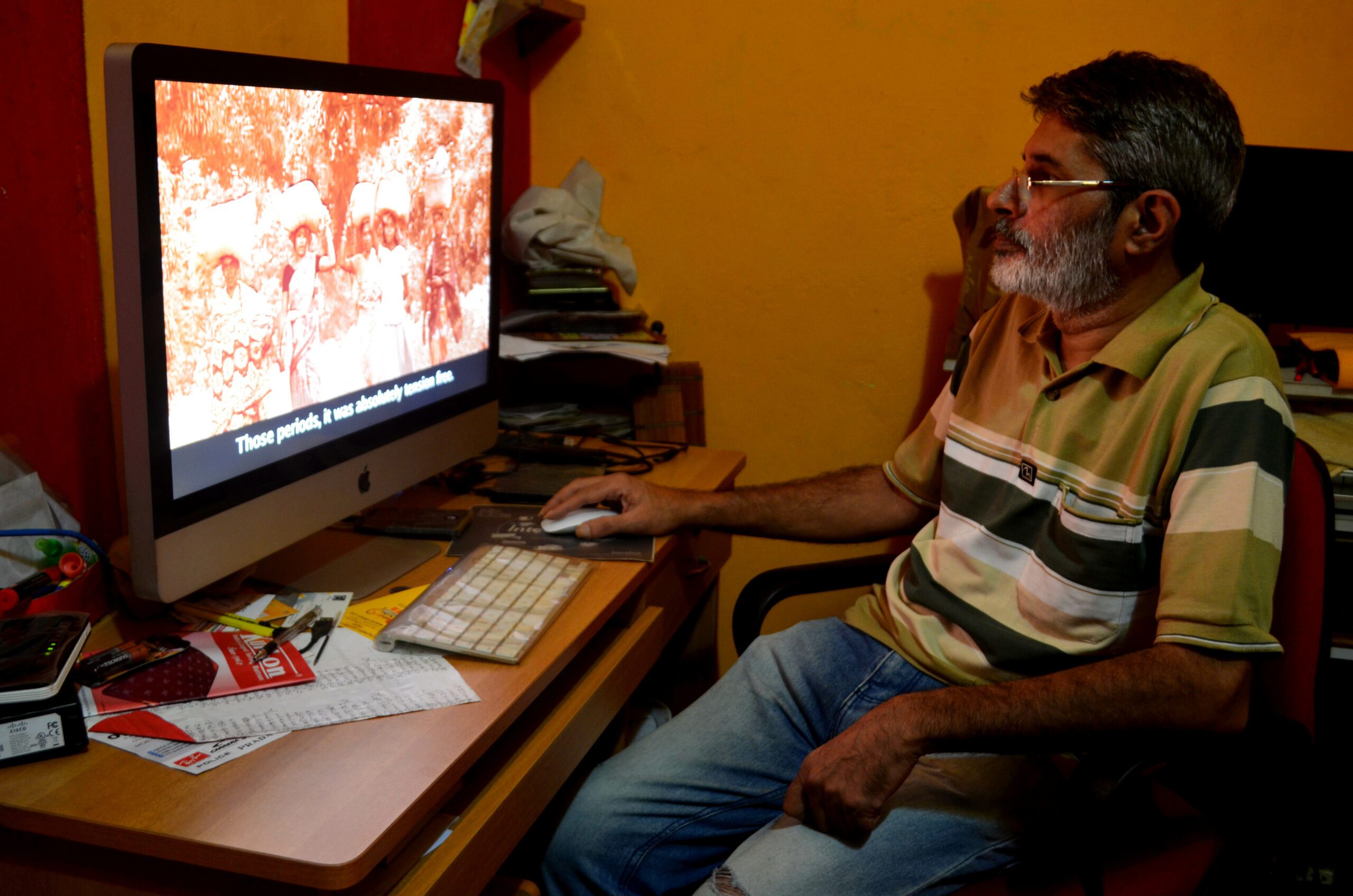The cartoonist-turned-documentary filmmaker chronicled people's movements across the country over the past 40 years.

Filmmaker KP Sasi during editing of one his documentaries in Kozhikode, Kerala. (Shafeeq Thamarassery)
Ideologically-driven documentary filmmakers have played a crucial role in strengthening civil society movements across India. They have stood solidly with ordinary people, faithfully recording the many crises they face because of the adverse impact of ill thought-out governmental projects and policies.
Their documentaries give voice to scattered movements of resistance which are often ignored by the authorities and attacked with powerful counter-propaganda by the mainstream media.
With the country’s hinterlands their natural home, they are a rare tribe who sacrifice their lives and personal growth in their mission to become the voice of the voiceless.
KP Sasi, who breathed his last at the age of 64 in Kerala’s Thrissur on Christmas Day, was one such documentary filmmaker who sacrificed himself for the many struggles of ordinary people across India.
Son of the illustrious Communist leader and theoretician K Damodaran, Sasi spent almost four decades travelling the country’s length and breadth, reaching out to Dalits, Adivasis, fish workers and other disempowered segments of the society to document their struggles for survival.
For Sasi, documentary films were not just a vocation. He identified with the struggling millions and remained honest while narrating the harsh realities confronting such communities to the world outside.
In that process, he suffered a lot. He had to give up an otherwise successful career as a newspaper cartoonist, and suffered frequent financial crises as he sought to continue with his film projects and meet personal expenses.
In a way, the filmmaker and activist in him were inseparable.
On occasion, he directly participated in the struggles like the Narmada Bachao Andolan and the anti-Coca Cola struggles in Plachimada. On other occasions, he reached out to journalists, pleading with them to cover long-ignored aspects of popular survival struggles.
And he always confronted the organised Left in India, to which his father made innumerable theoretical contributions, by questioning their perspectives on development and infrastructure.
He often clashed with leaders who, according to him, were aligned with crony capitalism and had forgotten the people they were supposed to represent.
But despite this, Sasi was always democratic, inclusive and sensitive to the causes he represented. He was the human face to Communism.
One of the earliest champions of documentary filmmaking in the country, he left Kerala at a young age and lived mostly in Bengaluru and Delhi.
During breaks from documentary filmmaking, Sasi vigorously pursued his cartoon skills and integrated them with his activism.
He had also penned numerous articles in newspapers and magazines; if compiled together, they will give a rare insight into India’s grave social realities.
KP Sasi
anti fascist film maker
cartoonist social activist
is no more.RPI pic.twitter.com/USRdHuLufM— N.Madhavan Kutty (@nandeilath) December 25, 2022
His films, articles and cartoons reflect his calibre — he was a veritable storehouse of knowledge and dedication to the marginalised.
He travelled extensively across the country, identifying himself with peoples’ movements ranging from Narmada Valley to Kashipur. On many occasions, he was a one-man army who found energy in adversities. He would even land in jail occasionally.
Till 1981, he drew cartoons for different Delhi newspapers, and his brilliant lines combined with his grasp of the realities around won him many followers.
Sasi’s affinity for documentary films began around the same time, especially after watching Anand Patwardhan’s Prisoners of Conscience (1978), which revolved around the Emergency.
He soon realised that documentaries were a more powerful medium for political expression than cartoons. But his documentary filmmaking was, in a way, an extension of cartooning — satire and sarcasm often marked his interpretations of governmental actions.
Over the years, Sasi evolved into a powerful voice of rebellion as he documented the struggles of people in the North East against AFSPA, the water wars of the people of Plachimada in Kerala, displacement of locals in Odisha in the face of the corporate takeover of their lands and livelihoods, and various unseen dimensions of the Narmada struggle.
He also addressed climate change, the environment, the Hindutva onslaught on minorities, and the growing hate and inequalities in the country.
To Sasi, documentaries were a part of his journalistic pursuits: Studying ignored issues, raising disturbing questions about them, and telling the absolute truth to the world outside.
With the music video America, America, he emerged as a critic of US imperialism and its adverse impacts on a changed world order. He identified himself with the people’s resistance in Iraq and Afghanistan.
He also directed two feature films — Ilayum Mullum in Malayalam and Ek Alag Mausam in Hindi — and they won critical acclaim. The Malayalam film discussed everyday violence faced by women, while Ek Alag Mausam highlighted the travails of those affected by HIV/AIDS.
Remembering KP Sasi, friend, filmmaker, activist. Made music videos that went viral before the word viral was invented. RIP my friend.https://t.co/j1WhFS1N5G
— NityanandJayaraman (@NityJayaraman) December 25, 2022
In recent years, Sasi was at the forefront of a movement supporting undertrials who languish in jails without trial.
He raised his voice in support of Abdul Nasar Mahdani, arguing that the government had failed to produce any concrete evidence against him, and was keeping him in jail out of pure communal malice and insensitivity.
If the social media posts mourning his death are any indication, Sasi had a large following across India, cutting across religion, language and other divisions.
He was a true pan-Indian, swayed only by the spirit of inclusiveness. And a public intellectual was honest and uncompromised by interest groups.
More than the field of documentary films, India’s civil society movements and the numerous newly-emerging survival struggles of ordinary people will badly miss Sasi in the coming days.
And in his home state Kerala, the organised Left will rue losing a long-term critic whose opposition was always ideological, never personal.

Jul 26, 2024

Jul 26, 2024

Jul 25, 2024

Jul 25, 2024

Jul 25, 2024

Jul 24, 2024